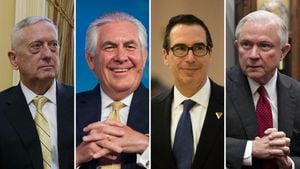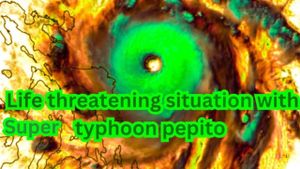Protests raged through the Russian-backed region of Abkhazia as demonstrators stormed their parliament, igniting tensions over proposed investments from Moscow. This breakaway territory, bordered by the Black Sea and the imposing Caucasus mountains, finds itself caught between local dissent and external influence.
On Friday, February 16, 2024, protesters seized control of the Abkhazian parliament, fueled by backlash against proposed legislation permitting Russian citizens to purchase property within its borders. Activists fear the measure could inflate local real estate prices and consolidate Russian dominance over the region.
The unrest was punctuated by violence, resulting in at least 14 injuries following clashes between opposition groups and police forces. Demonstrators were seen throwing rocks and vandalizing property, prompting law enforcement to respond with tear gas.
Among the loudest dissenters was the former Abkhazian Prime Minister, Valery Bganba, who told the crowd, “We did not come here for parliamentary seats. We came here to save our people and our country.” Their refusal to vacate the parliament became symbolic of their demand for unqualified change. Amid this backdrop, Abkhazia’s President, Arslan Bzhania, found himself under overwhelming pressure.
Bzhania announced his willingness to resign if the crowds departed from the parliament premises. According to reports from Russian news agency RIA, he stated, “When they leave the building, I will write my resignation letter and proceed with elections,” implying he would offer himself as a candidate.
The unrest follows years of grievances against Bzhania’s administration, primarily surrounding controversial negotiations with Moscow. The latest investment deal has faced particularly strenuous opposition, as many locals see it as another step toward relinquishing their already tenuous autonomy to Russian interests. Critics accuse Bzhania of exploiting these ties for personal benefit, rather than seeking to bolster the region's independence.
During what authorities are now terming the “occupy parliament” movement, demonstrators emphasized their commitment not merely to resisting Russian encroachment on their territory, but to reforming their own governance as well. Human rights activists have voiced concerns about the impact of the proposed property law. Critics argue it favors foreign investors—chiefly Russians—while exacerbately disenfranchising local residents.
Following the parliament storming, Bzhania addressed his supporters, claiming order would soon be restored. He reassured his followers, “We have laws. We have a homeland we must serve.” Meanwhile, Russian officials were monitoring the 'crisis situation,' warning citizens against traveling to the already tumultuous region.
Compounding the political friction, many are using this moment to spotlight existing disparities, accusing Bzhania of being out of touch with the sentiments of his people. The protests come following his administration's earlier withdrawal of another contentious investment measure, dubbed the “apartments law,” which sought to allow the sale of residential properties to foreign buyers.
Despite being recognized by Russia following the 2008 conflict, Abkhazia is still largely regarded by the global community as part of Georgia. The separatist republic has since enjoyed significant Russian support, including military presence and economic backing, which locals feel could be undermining their sovereignty.
With the Bzhania leadership now tenuously balanced, the region watches intently to see whether the protesters will relent or if their demands will push through real change. The question remains: will the current administrations across both sides heed the voice of the demonstrators, or will tensions continue to escalate?



